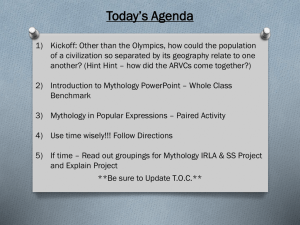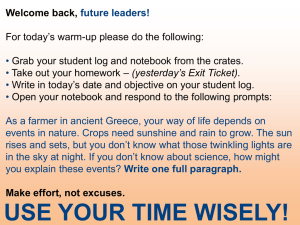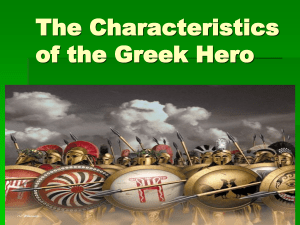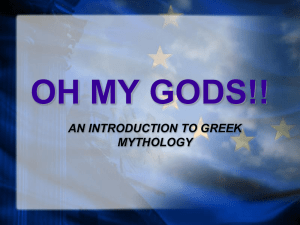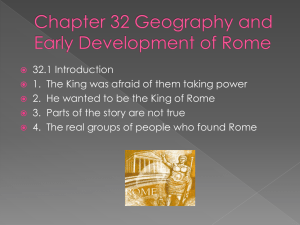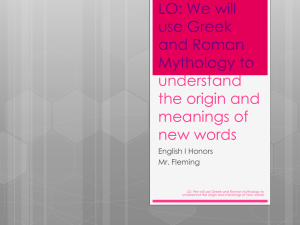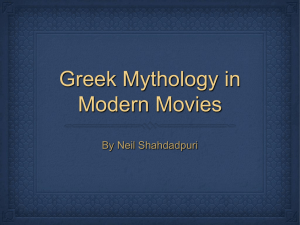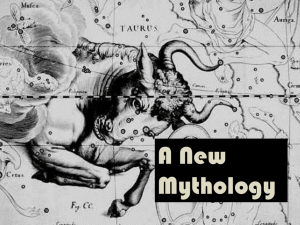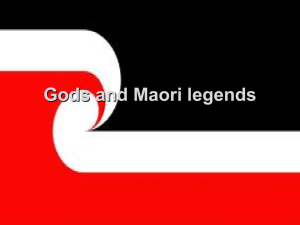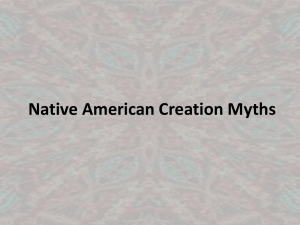H9 Mar 14th – 18th
advertisement
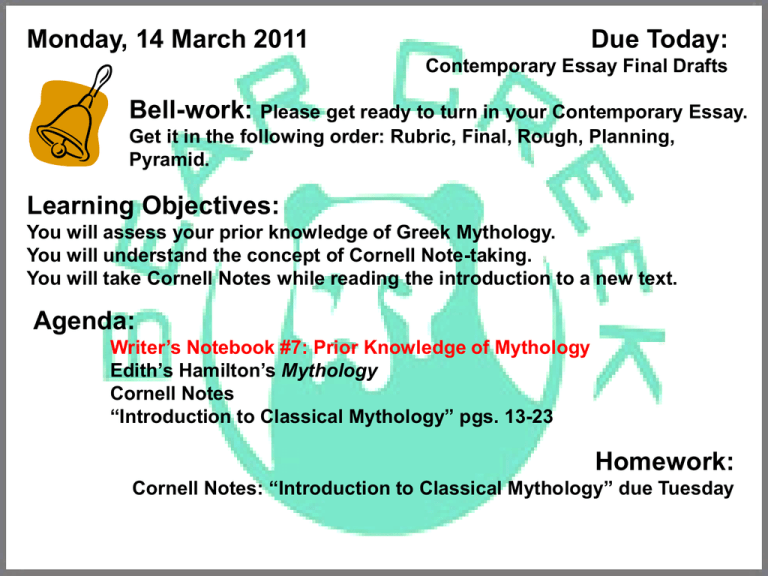
Monday, 14 March 2011 Due Today: Contemporary Essay Final Drafts Bell-work: Please get ready to turn in your Contemporary Essay. Get it in the following order: Rubric, Final, Rough, Planning, Pyramid. Learning Objectives: You will assess your prior knowledge of Greek Mythology. You will understand the concept of Cornell Note-taking. You will take Cornell Notes while reading the introduction to a new text. Agenda: Writer’s Notebook #7: Prior Knowledge of Mythology Edith’s Hamilton’s Mythology Cornell Notes “Introduction to Classical Mythology” pgs. 13-23 Homework: Cornell Notes: “Introduction to Classical Mythology” due Tuesday Writer’s Notebook #4 Prior Knowledge of Greek Mythology 3/14/10 • With your NEW reading partner, discuss your prior knowledge of Greek Mythology. • What Gods/Goddesses do you know or have you heard of? • What stories have you read in the past? • What connections can you make between Greek Mythology and contemporary society? Cornell Notes: • http://coe.jmu.edu/learningtoolbox/cornelln otes.html Your Name Honors English 9 Mr. Bernstein 14 March 2011 Hellenic Nature Nymph/Naiads Proteus/Triton The Forest synonym for Greek Mythology contains stories about people who had a strong connection with nature A female spirit usually retained for service by a god or goddess The sons of Poseidon, god of the sea Horrible things happened in the forest – Magic & Human Sacrifice. Pain and evil were a part of every story. The opening section of Introduction to Classical Mythology introduces a few terms relevant to Greek Mythology, but mainly informs readers that by reading these stories, we can gain an understanding of what life was like thousands of years ago. Your Name Honors English 9 Mr. Bernstein 14 March 2011 Mythology of Greeks Primitive, savage, ugly at times Don’t really shed light on what life was like It does show things about ourselves (intellect, politics, art); we are their decedents The Greek Miracle A new birth or awakening of Greece (out with the old & in with the new) Why & When? No idea Mankind – center of the universe Made gods in their own image “invisible must be understood by visible” Human Gods Still feared – very powerful & dangerous when angry Laughter is okay Exceedingly humanly attractive – some heroes of the stories behaved better than the gods/goddesses at times Humans didn’t have terror or fear of gods; they weren’t supernatural. There weren’t ghosts, but sometimes there were beast gods or mythical monsters Your Name Honors English 9 Mr. Bernstein 14 March 2011 Religion Mythology had nothing to do with religion It was created as an attempt to explain nature (how things came to be; human existence) Some religion in background Science Myths were early form of science, literature, and entertainment. It established right & wrong for themselves, but not the gods Justice was an important theme Writers Many writers contributed to Greek & Roman mythology including Ovid, Hesiod, Homer, Pindar, Aeschylus, and others This section of Introduction to Classical Mythology reviewed why Greek Mythology is applicable to contemporary readers and also discussed the “new birth” or awakening of Greece that spurred mythology. We learned how Greek gods were exceedingly human and regularly interacted with mortals. The sections also mentions how there isn’t a lot of religious relevance to the gods and mythology. Instead, we learned that they were created as an early form of science in order to explain how things came into existence. Lastly, the reading mentions some important Greek and Roman writers that contributed to our understanding. Tuesday,15 March 2011 Due Today: Cornell Notes: “Introduction to Classical Mythology” Bell-work: Please get ready to turn in your Cornell Notes on the Introduction to Classical Mythology. Learning Objectives: You will understand key concepts in the Introduction to Classical Mythology. You will select and record relevant information from a presentation. You will begin to read about the gods & goddesses of Greek & Roman mythology. Agenda: “Introduction to Classical Mythology” pgs. 13-23 Cornell Notes Review Writer’s Notebook #8: Notes on Mythology Mythology: “The Gods” Homework: Begin reading Mythology: “The Gods” pgs. 24-36 Writer’s Notebook #5 Introduction to Mythology 3/16/10 • Please select relevant important information from the introductory power point covering Mythology. Wednesday, 16 March 2011 Due Today: Ø Bell-work: Please pick up The “Big 12” Chart from the stool on the way to your seat. Learning Objectives: You will understand the directions for completing The “Big 12” Chart. You will begin to categorize gods and goddesses by Greek/Roman names, realm, and symbol. You will get acquainted with a new reading partner. Agenda: Reading Partners Mythology: “The Gods” ~ The “Big 12” Chart Homework: Mythology: “The Gods” pgs. 24-36 due Friday The “Big 12” Chart due Friday 5th Period Reading Partners • B • J 7th Period Reading Partners • D • H Friday, 18 March 2011 Due Today: The “Big 12” Chart Bell-work: Prepare to turn in your “Big 12” Chart. Learning Objectives: You will review for a test over Greek & Roman gods & goddesses. You will categorize gods and goddesses by Greek/Roman names, realm, and symbol. Agenda: The “Big 12” Jeopardy Review Homework: Zeus Hera Poseidon Hades Hestia Ares Athena Apollo Aphrodite Hermes Artemis Hephaestus 100 100 100 100 100 100 100 100 100 100 100 100 200 200 200 200 200 200 200 200 200 200 200 200 300 300 300 300 300 300 300 300 300 300 300 300 Greek Name Roman Name Realm Symbol I I I I II II II II III III III III IV IV IV IV V V V V
